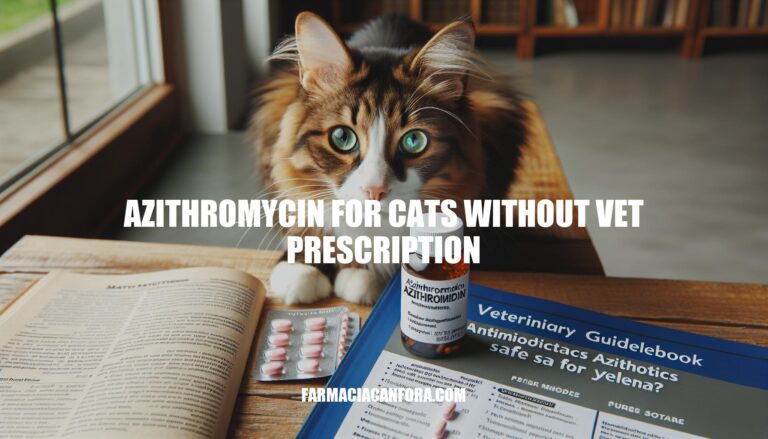Azithromycin is an antibiotic commonly used to treat bacterial infections in cats, such as respiratory infections, skin infections, and certain types of diarrhea. Pet owners might seek azithromycin without a prescription due to its effectiveness and the desire to avoid the cost and time associated with a vet visit. However, it’s important to note that azithromycin is a prescription medication and should ideally be used under veterinary guidance to ensure proper dosage and to avoid potential side effects.
Legal and Safety Concerns
Obtaining azithromycin for cats without a veterinary prescription has several legal and safety implications.
Legal Implications:
- Prescription Requirement: Azithromycin is a prescription-only medication. Dispensing it without a prescription is illegal in many regions, including the U.S. and the EU.
- Regulatory Compliance: Pharmacies and online retailers must comply with regulations that prevent the sale of prescription medications without proper authorization.
Safety Concerns:
- Incorrect Dosage: Without veterinary guidance, there’s a risk of administering the wrong dosage, which can lead to ineffective treatment or adverse effects.
- Misdiagnosis: Self-diagnosing your cat’s condition can result in inappropriate use of antibiotics, potentially worsening the condition or causing unnecessary side effects.
- Antibiotic Resistance: Improper use of antibiotics can contribute to antibiotic resistance, making future infections harder to treat.
Importance of Veterinary Guidance:
- Accurate Diagnosis: Vets can accurately diagnose the condition and determine if azithromycin is the appropriate treatment.
- Proper Dosage and Administration: Vets provide precise dosage instructions and monitor for side effects, ensuring safe and effective treatment.
- Comprehensive Care: Veterinary guidance includes follow-up care and adjustments to treatment as needed, ensuring the best outcome for your cat.
Always consult a veterinarian before administering any medication to your pet to ensure their safety and well-being.
Potential Risks and Side Effects
Using azithromycin for cats without a vet prescription can be risky. Here are the potential risks and side effects:
- Digestive Issues: Vomiting, diarrhea, belly pain, and decreased appetite due to nausea.
- Liver Damage: In rare cases, azithromycin can cause liver damage.
- Blood Cell Count: It may lead to a decrease in white blood cell count, which can be severe.
- Antibiotic Resistance: Improper use can contribute to antibiotic resistance, making future infections harder to treat.
Correct Dosage: It’s crucial to follow a vet’s prescription to ensure the correct dosage and avoid these adverse reactions. Self-medicating your cat can lead to serious health issues or even be fatal. Always consult a veterinarian before giving any medication to your pet.
Alternatives to Azithromycin
Here are some over-the-counter alternatives to azithromycin for cats:
- Probiotics: Boost gut health and overall immunity.
- Cranberry Supplements: Support urinary tract health.
- Echinacea: Enhance the immune system.
- Manuka Honey: Antimicrobial properties, good for wound care.
- Apple Cider Vinegar (diluted): Alleviates minor skin issues.
- Fish Oil Supplements: Anti-inflammatory, great for skin and coat.
- Goldenseal: Antimicrobial properties.
- Silver Sulfadiazine Cream: Excellent for burns and surface wounds.
- CBD Oil: Reduces anxiety, some anti-inflammatory benefits.
- Dietary Adjustments: Tailored nutrition can bolster health.
Always consult with a vet before starting any new treatment to ensure it’s safe for your cat.
Important Safety Warning:
Using azithromycin for cats without a veterinary prescription is illegal and poses significant safety risks. The potential consequences include incorrect dosage, misdiagnosis, antibiotic resistance, digestive issues, liver damage, blood cell count decrease, and even fatal health issues.
It’s crucial to consult a veterinarian before administering any medication to ensure proper treatment and avoid adverse reactions.
A Safer Approach:
Instead of self-medicating, consider over-the-counter alternatives such as:
- Probiotics
- Cranberry supplements
- Echinacea
- Manuka honey
- Apple cider vinegar
- Fish oil supplements
- Goldenseal
- Silver sulfadiazine cream
- CBD oil
Or, make dietary adjustments under the guidance of a veterinarian to ensure your cat’s safety and well-being.


